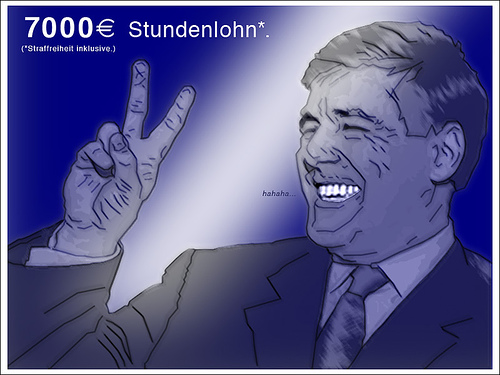Josef Ackermann: The Most Dangerous Banker in the World

Please note that we are not authorised to provide any investment advice. The content on this page is for information purposes only.
14 June 2011.
In May this year, Deutsche Bank Chief Executive Josef Ackermann appeared in a Munich court to testify in a lawsuit against the bank by fallen German media mogul Leo Kirch.
The spat: Kirch wants 2 billion Euros from the bank he alleges triggered the Kirch Group’s collapse by questioning the creditworthiness of his media empire in a 2002 Bloomberg Television interview.
Ackermann is the main witness. And 84 year old, virtually blind Kirch has had little luck claiming damages. You don’t want to mess with this guy.
14 June 2011.
In May this year, Deutsche Bank Chief Executive Josef Ackermann appeared in a Munich court to testify in a lawsuit against the bank by fallen German media mogul Leo Kirch.
The spat: Kirch wants 2 billion Euros from the bank he alleges triggered the Kirch Group’s collapse by questioning the creditworthiness of his media empire in a 2002 Bloomberg Television interview.
Ackermann is the main witness. And 84 year old, virtually blind Kirch has had little luck claiming damages. You don’t want to mess with this guy.
Now, he’s at the forefront of the European sovereign debt crisis as European Union policy makers clash over how to prevent the currency region’s default after 256 billion Euros in bailouts to Greece, Ireland and Portugal failed to stop the debt crisis.
Related: A 2008-Scale European Financial Crisis This Year? Niall Ferguson
Deutsche Bank had sovereign risks worth 1.6 billion euros tied to Greece. In the last 12 months, the bank’s shares have fallen 3.3 percent.
Ackermann says, [quote]”We believe there is still significant upside potential in the bank’s share price” and “Despite all adversities, we can look ahead to the future with great confidence”[/quote]
Reiterating the bank’s full year operating profit target of 10 billion euros helped by gains in investment banking and expansion in Asia where the bank aims to be among the top 3 in the region.
But the high targets in time of crisis can only mean one thing: encourage bankers and traders to take more risks and employ lots of leverage to fuel profits.
Some economists say, only banks that know they would be rescued if they ran into trouble (Too Big To Fail) would take such risks.
Ackermann emerged from the panic of 2008 after pledging 8.5 billion Euros to bailout a big German bank on the brink of collapse. He is at the centre of more power circles than any other banker in the Continent.
And he’s helping shape Europe’s economic and financial future. From advising politicians and policy makers on the Greek debt crisis to economic relations in Europe and the ECB’s future.
Make no mistake, Ackermann’s allegiances lie with the banks.
He insisted providing debt relief for Greece would be a huge mistake.
Why? After all, European banks, including Deutsche Bank holds billions of Euros in Greek government bonds, and the banks would lose big of those debts were restructured.
More bailout money and more austerity on the other hand means: buying time without hope of recovery.
So what about tighter regulations learning from the crisis in the financial industry?
Never. Ackermann like other banks such as Goldman Sachs, Morgan Stanley and Citigroup believe reducing use of leverage will reduce their profits and, wait for it:
Cause a credit crunch.
Europeans say: they’re paying the price for the excesses of bankers.
When it comes to the Greek crisis, Ackerman doesn’t think the country can repay its debts. And cautions the existence of the euro would be in jeopardy if investors lost confidence in other weak economies in the 17-member monetary union.
“The biggest challenge now is to convince people of any country to help Greece even more” he said in an interview and called on European governments to devise a “Marshall Plan” for Greece offering more aid while forcing the country to sell billions of euros’ worth of state assets and provide a framework for rebuilding its economy.
European governments have followed that advice.
But Ackermann opposes the German government and sides with the ECB when it comes to restructuring the Greek debt, which would force investors and banks to share Greece’s debt.
In a speech about the loss of confidence in the banking industry, Ackermann proclaimed:
[quote] “Deutsche Bank has further enhanced a good reputation it enjoys all over the world” and continues “ No business transaction is worth risking this good reputation and the bank’s credibility.”[/quote]But the bank was a big player in the toxic collateralized debt obligations that Wall Street sold during the US mortgage bubble.
This year, the bank continues to churn out CDOs even as the market collapses.
In March, the bank was ruled to compensate a small business customer for losses incurred as a result of interest rate swaps.
In the US, MortgageIT, a bank subsidiary was accused of lying about the quality of home loans it handled under a government program and demanded the bank repay hundreds of millions of dollars.
Ackermann’s defense: That happened in 2007. We’re changed since the crisis.
Liz Zuliani, EconomyWatch.com




